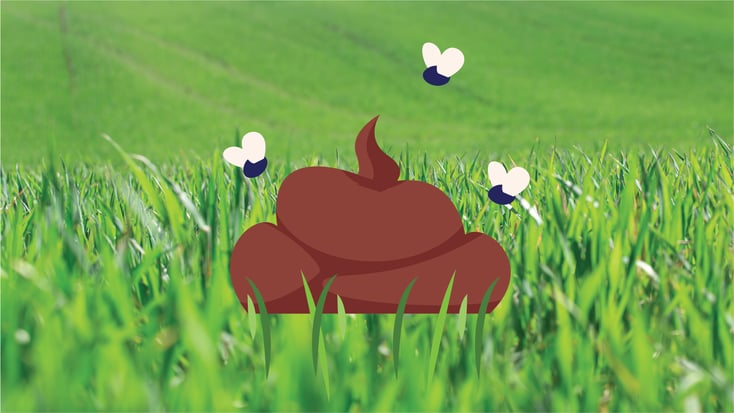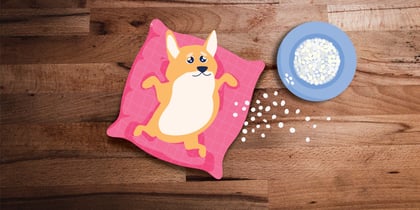Maggots in Dog Poop: Causes, Symptoms, & Treatment

Table of Contents
Discovering unusual organisms in your dog's poop can be a distressing experience for any pet owner. Pet parents must understand the underlying causes of maggot infestation, whether it is a visual illusion or real maggots. Appropriate action must be taken.
This blog post will explore the relationship between maggots and worms in dog poop. We will also discuss the symptoms to watch for. Finally, we will provide insights into the treatment options available.
Key Takeaways:
- Maggots in dog poop are usually a sign of worms rather than actual maggots.
- Maggots in dog poop are normal if the feces have been on the ground for some time, but picking up the poop more frequently can help prevent their appearance.
- Seek immediate veterinary attention if you see maggots around your dog's rear end or on any wounds.
- If you see signs of worms in dog poop, schedule a check-up with your veterinarian for appropriate worming treatment.
What Are Maggots in Dog Poop?
Maggots are the larvae of flies and are typically involved in the natural process of decomposing organic matter. While their presence may be concerning, it's normal for them to appear after the dog has defecated, especially if the poop has been on the ground for some time.
There is no need to worry if you see maggots in dog poop. You might just want to think about picking up your dog’s poop more frequently.
However, if you notice maggots around your dog's rear end or on any wounds, it's important to seek immediate veterinary attention.
Hassle-free In-Home Pet Sick Visits
When your pet isn't feeling well, the last thing you want is a stressful trip to the vet. Our in-home sick pet visits offer a calm, stress-free alternative.
Difference Between Maggots & Worms in Dog Poop
If you see things resembling maggots in your dog's poop, it usually indicates worms rather than actual maggots. These "maggot-like" organisms are often the larvae of worms, such as roundworms or tapeworms, which have been passed in the stool.
On the other hand, if you find actual maggots in your dog's feces, it suggests that flies have laid eggs on the stool after it was passed.
Types of Worms Found in Dog Poop
Here are the most likely parasites to be causing problems:
Intestinal parasites
Your dog can be infected with parasites and not see any in their bowel movements, as usually only the tiny eggs will be passed. Adult worms are generally only seen in the poop if the worm burden is very high.
- Hookworms: Thin, tiny worms with a hooked mouthpart at one end.
- Whipworms: Resemble thin pieces of thread, slightly larger at one end than the other.
- Roundworms: White or tan-colored, very long worms that can look like spaghetti.
- Tapeworms: Adults aren't found in the feces, but you may see their egg sacs, which look like grains of rice, either in the poop itself or stuck around your dog's back end.
Environmental parasites
If you don’t clear up your dog’s poop immediately, it can quickly become colonized by small beasties living in the ground outside.
-
Maggots: These are fly larvae and are small and very active.
-
Earthworms: These are medium worms that are brown or pink in color.
-
Red worms: These are small, red, and wriggly.
How Did My Dog Get Worms in its Poop?
Worm infestations in dog poop can occur due to various factors. Dogs can acquire worms through multiple means, such as ingesting infected fleas or contaminated feces.
Signs & Symptoms of Worms in Dog Poop
Seeing signs of worms in dog poop imply a heavy burden of worms internally, which can cause multiple symptoms. These include:
-
Diarrhea, which may contain blood or mucus
-
Bloated tummy
-
Weight loss and poor condition
-
Poor appetite or voracious appetite
-
Poor growth in puppies
-
Tummy pain
If you notice any of these symptoms or worms in your dog's poop, it's crucial to consult with your veterinarian for proper diagnosis and treatment.
Should My Pet Be Seen by a Veterinarian?
1. Have you noticed changes in your pet’s appetite?
2. Does your pet have diarrhea or loose stools?
3. Have you noticed changes in your pet’s thirst/water consumption?
4. Is your pet having accidents in the house?
5. Is your pet pacing and unable to settle?
6. Is your pet panting more than usual?
7. Is your pet whining or vocalizing more than usual?
8. Is your pet shaking more than usual?
9. Is your pet hiding or avoiding physical contact more than usual?
10. Is your pet more lethargic and sleeping more than usual?
11. Are you concerned about changes in your pet’s behavior?
12. Is your pet scratching their ears?
13. Is your pet licking their paws more than usual?
14. Does your pet have a rash?
15. Is your pet moving more slowly than usual or having a harder time getting up or down?
View Results
Should My Pet Be Seen by a Veterinarian?
1. Have you noticed changes in your pet’s appetite?
2. Does your pet have diarrhea or loose stools?
3. Have you noticed changes in your pet’s thirst/water consumption?
4. Is your pet having accidents in the house?
5. Is your pet pacing and unable to settle?
6. Is your pet panting more than usual?
7. Is your pet whining or vocalizing more than usual?
8. Is your pet shaking more than usual?
9. Is your pet hiding or avoiding physical contact more than usual?
10. Is your pet more lethargic and sleeping more than usual?
11. Are you concerned about changes in your pet’s behavior?
12. Is your pet scratching their ears?
13. Is your pet licking their paws more than usual?
14. Does your pet have a rash?
15. Is your pet moving more slowly than usual or having a harder time getting up or down?
Share Quiz
Treatment Options for Worms in Dog Poop
Spotting worms in dog poop is a clear sign that your dog requires worming treatment. The best thing to do is to schedule a check-up with your veterinarian, who can dispense anti-parasite medication. These drugs come in many different forms, including tablets, liquids, topical applications, and injections. After treatment, you may see dead worms in the dog poop as they pass out of the body – this is common and nothing to worry about.
If your dog becomes ill from a worm infection, showing signs such as an upset tummy, it may need additional support. This might include a highly digestible diet for a few days until the gut recovers.
Can You Prevent Worms?
Yes, it is recommended to use regular treatments to prevent worms, as they are so common in the environment and can cause significant illness. Your veterinarian can regularly test your dog’s stool to check for signs of worm eggs that may need treatment. If you are unsure about what to do regarding parasite prevention, a virtual vet visit may be a good place to start discussing your pet’s needs.
Conclusion
In conclusion, discovering maggots in your dog's poop can be alarming, but it's important to address the underlying issues promptly. Understanding the causes and taking appropriate action can ensure your dog's health and prevent future occurrences. If you have concerns or need guidance on parasite prevention, the expertise of a veterinarian is indispensable.
Book an in-home pet sick visit to have your pet thoroughly examined and to address any health concerns promptly. Your dog's well-being and your peace of mind are paramount; don't delay in seeking the best care for your furry friend.
Frequently Asked Questions
What do maggots in dog poop look like?
Maggots in dog poop are small, cylindrical larvae with a creamy white or off-white color. They are known for their wriggling and active movement, making them easily distinguishable from other organisms present in the feces.
Can people catch worms from dogs?
Some intestinal worms in dogs are transmissible to humans and can cause severe disease. Roundworms can be a particular concern, as roundworm eggs, if ingested, can migrate all over the body, including to the liver, eyes, and brain. Children, the elderly, and the immunocompromised are more at risk. The Centers for Disease Control (CDC) has more information on the risks of pet parasite transmission to owners.





